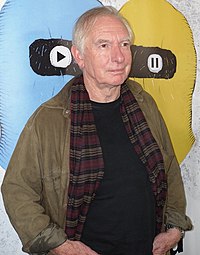
Back بيتر وير (مخرج) Arabic بيتر وير ARZ Пітэр Уір Byelorussian Питър Уиър Bulgarian পিটার উইয়ার Bengali/Bangla Peter Weir Catalan Peter Weir Czech Peter Weir Danish Peter Weir German Πίτερ Γουέαρ Greek
Peter Weir | |
|---|---|
 Weir in 2011 | |
| Born | Peter Lindsay Weir 21 August 1944 Sydney, Australia |
| Occupations |
|
| Years active | 1967–2010 |
| Spouse | |
| Children | 2 |
| Signature | |
 | |
Peter Lindsay Weir AM (/wɪər/ WEER; born 21 August 1944) is an Australian retired film director. He is known for directing films crossing various genres over forty years with films such as Picnic at Hanging Rock (1975), Gallipoli (1981), The Year of Living Dangerously (1982), Witness (1985), Dead Poets Society (1989), Fearless (1993), The Truman Show (1998), Master and Commander: The Far Side of the World (2003), and The Way Back (2010). He has received six Academy Award nominations. In 2022, he was awarded the Academy Honorary Award for his lifetime achievement career.[1] In 2024, he received an honorary life-time achievement award at the Venice Film Festival (Golden Lion).[2]
Early in his career as a director, Weir was a leading figure in the Australian New Wave cinema movement (1970–1990). Weir made his feature film debut with Homesdale (1971), and continued with the mystery drama Picnic at Hanging Rock (1975), the supernatural thriller The Last Wave (1977) and the historical drama Gallipoli (1981). Weir gained tremendous success with the multinational production The Year of Living Dangerously (1982).
After the success of The Year of Living Dangerously, Weir directed a diverse group of American and international films covering most genres–many of them major box office hits–including Academy Award-nominated films such as the thriller Witness (1985), the drama Dead Poets Society (1989), the romantic comedy Green Card (1990), the social science fiction comedy-drama The Truman Show (1998) and the epic historical drama Master and Commander: The Far Side of the World (2003). His final feature before his retirement was the well-received The Way Back (2010).
- ^ "THE ACADEMY TO HONOR MICHAEL J. FOX, EUZHAN PALCY, DIANE WARREN AND PETER WEIR WITH OSCARS® AT GOVERNORS AWARDS IN NOVEMBER". oscars.org. The Academy of Motion Picture Arts and Sciences. Archived from the original on 8 August 2022. Retrieved 8 August 2022.
- ^ "Reuters". Reuters. Retrieved 7 September 2024.